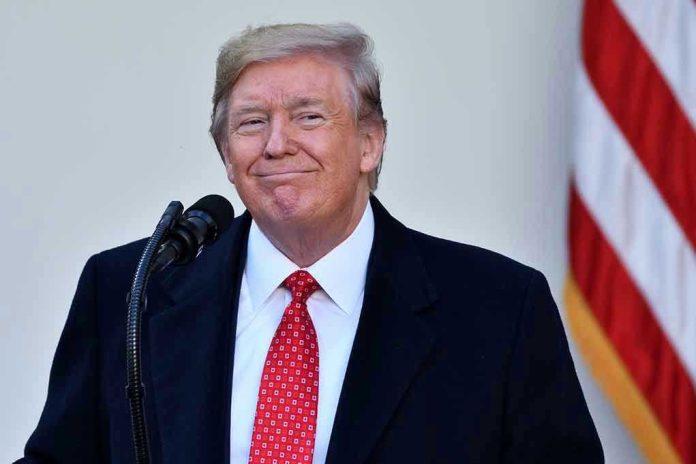
The real shock isn’t that Sydney Sweeney faced a firestorm over a pair of jeans—it’s how one ad campaign spiraled into a referendum on political identity in America, forcing both celebrities and brands to tiptoe through a cultural minefield where even silence becomes a statement.
Story Snapshot
- Sydney Sweeney’s American Eagle ad ignited controversy over perceived political undertones and links to Donald Trump’s support base.
- Sweeney publicly clarified her position, rejecting any explicit political endorsement and addressing the backlash head-on.
- The uproar exposed the increasing politicization of celebrity endorsements and advertising in a polarized climate.
- Brands and public figures now face heightened scrutiny and new risks when creative choices are open to political interpretation.
How an American Eagle Ad Became a Lightning Rod
American Eagle launched its October 2025 campaign featuring Sydney Sweeney with the intention of capturing Gen Z’s attention, but the result was a cultural flashpoint. Social media users, ever vigilant for subtext, quickly latched onto visual motifs and taglines that appeared to nod toward American political themes. Critics speculated about Sweeney’s political leanings, with some interpreting the campaign as a subtle signal to Donald Trump’s support base. The conversation snowballed from isolated tweets to a trending topic, and soon mainstream media joined the feeding frenzy.
Sydney Sweeney breaks silence on controversial American Eagle ad, addresses Donald Trump’s support https://t.co/cJ57bYYzQm pic.twitter.com/YE8OhMX2PZ
— Page Six (@PageSix) November 4, 2025
The controversy escalated rapidly because in today’s climate, brand messaging is rarely just about style or identity—it’s scrutinized as a cultural statement. American Eagle’s marketing team found themselves defending creative decisions that, just a decade ago, would have passed as innocuous. The backlash revealed a new reality: any ambiguity in messaging can be weaponized by audiences primed for outrage or affirmation, depending on their political persuasion.
Sydney Sweeney’s Response and the Perils of Celebrity Endorsement
By early November, Sweeney broke her silence, issuing a public statement that tackled both the ad’s intent and the wider issue of political association in celebrity culture. She stressed that the campaign was not designed as a political message and categorically distanced herself from any explicit support for Donald Trump. Her response was measured, acknowledging the sensitivity of the moment without caving to pressure from any ideological camp.
This episode put a spotlight on the precarious position celebrities now occupy. Sweeney, like many before her, found herself at the intersection of commerce, culture, and politics—where a role in a clothing ad could be recast as a personal manifesto. Her swift, direct response won praise from crisis communication experts, who noted that transparency and speed are now essential survival skills for anyone in the spotlight. Yet, the fact that such clarifications are necessary demonstrates how fraught the terrain has become.
The Broader Fallout: Brands, Backlash, and a New Playbook
American Eagle chose not to issue a formal apology, reiterating its commitment to inclusivity and creative freedom. While some commentators commended this stance, others saw it as a calculated risk, given the company’s core demographic. The campaign remains a topic of heated debate in marketing circles, not least because it underscores the rising costs—both reputational and financial—of misreading the cultural moment.
Marketers and analysts point to the Sweeney incident as a textbook case of the dangers of ambiguous symbolism in high-profile campaigns. The lesson: creative ambiguity, once seen as a clever way to appeal to broad audiences, now courts backlash from all sides. This shift is forcing brands to reevaluate not only their messaging but the vetting process for every creative decision. The stakes are especially high in America’s current climate, where cultural signals are dissected for hidden meanings, and even unintended implications can have real economic consequences.
Industry Reckoning: Lessons for the Future of Advertising and Celebrity Culture
Many experts believe this episode will have both immediate and lasting effects on how brands approach celebrity partnerships. Short-term, expect increased scrutiny of every aspect of campaign design, with legal and PR teams playing a bigger role in pre-empting backlash. Long-term, the Sweeney controversy could accelerate a trend toward more overtly apolitical advertising—or, paradoxically, embolden some brands to lean into controversy as a calculated risk for attention.
The broader entertainment and advertising industries are already feeling the pressure. The demand for crisis management and rapid-response expertise is rising, as is a more cautious approach to creative risk. For celebrities, the message is clear: any public association can be interpreted through a political lens, and silence is no longer a shield. The Sweeney incident is more than a one-off media storm—it’s a signal that the rules of engagement for public figures and brands have changed, and there’s no going back.
Sources:
AdSkate, “Sydney Sweeney American Eagle Ad: Backlash and Lessons”

